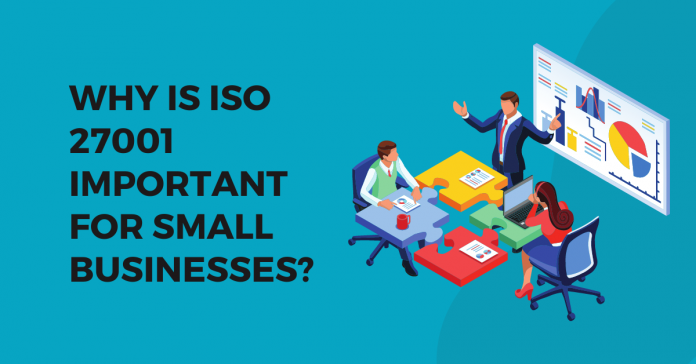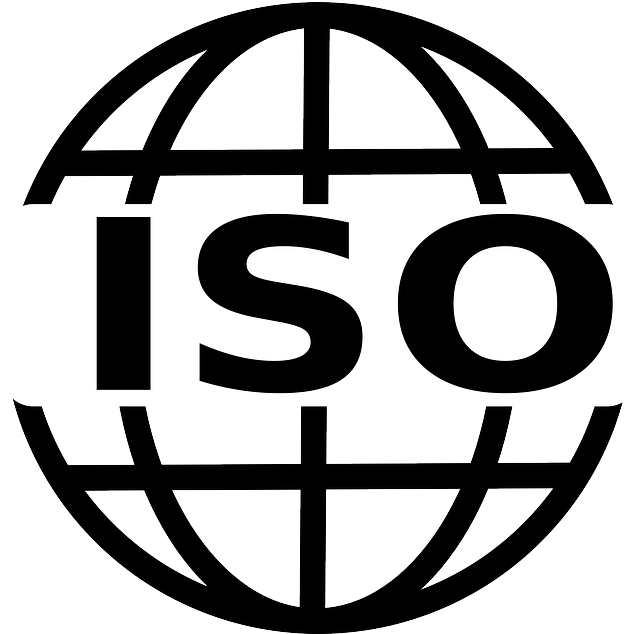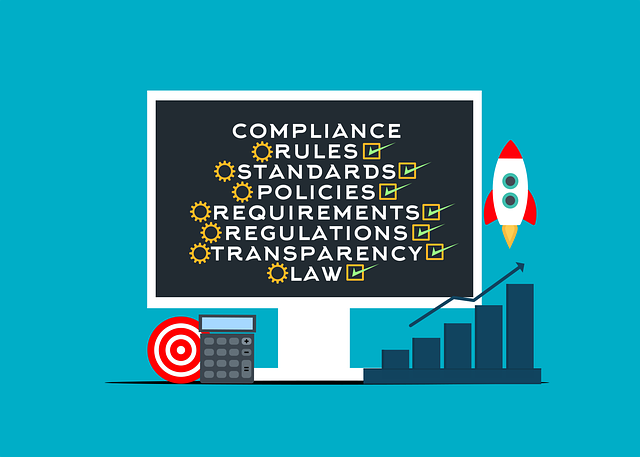This post will show you why ISO 27001 is important for small businesses…
Information security refers to the measures taken to keep data secure from unauthorized access or changes.
Whether large or small, all businesses are vulnerable to information security threats, leading to costly damages to both profits and the reputation of the business. Therefore, being proactive in information security is crucial for any business.
Accounting for about 90% of businesses and 50% of employment worldwide, Small and Medium Enterprises (SMEs) play a crucial role in the economy by creating jobs, innovating new products and services, and generating significant growth for economies across the world (World Bank).
Although the ISO 27001 standard is more commonly associated with large businesses, it is amenable and can be adapted by small businesses to cover their information security needs.
Table of Contents
What Is ISO 27001?
ISO 27001 (ISO/IEC 27001 – Information Security – Security Techniques – Information Security Management Systems – Requirements) is an internationally recognized standard for information security.
It helps businesses manage information security needs through the policies and processes outlined in the ISO 27001 framework. Key to these processes is the implementation of an Information Security Management System (ISMS) within a business to cost-effectively and systematically protect information assets and data.
It is important to remember that ISO 27001 is an information security standard and is not restricted to Information Technology (IT) companies. Businesses in various sectors can adapt it as the framework of best practices for protecting their information.
Simply put, the framework provided by the ISO 27001 standard establishes, implements, maintains, and regularly reviews and improves the ISMS to protect information assets better.
Implementing The Standard In Your Small Business
Small businesses serve as easy targets for cyber criminals due to their lack of resources to protect themselves.
Insufficient knowledge of information security and a scarcity of written policies on what to do in the event of an attack are the reasons small businesses are attractive targets. The ISO 27001 standard is one efficient way to combat this issue.
Obtaining the ISO 27001 certification means fulfilling some key requirements:
Audits
Central to the certification are the audits that are carried out to test the viability of your ISMS. Audits, both internal and external, verify the business’s compliance with the standard.
Documents
After your ISMS is tested and verified, you need to prepare your documents to get the certification. Documents include your ‘Scope’ document, your Information Security Policy Framework, and your Statement of Applicability (SoA).
Best Practices
Compliance with ISO 27001 standards is a continuous process and a number of best practices allow you to test your system and be updated on compliance guidelines regularly.
For example, businesses may choose to carry out network penetration tests, also known as ‘white hat attacks’ or ‘ethical hacking.’ These are done to identify vulnerabilities in your network and system to prevent future attacks and breaches.
Information Security And Small Businesses
Costs of cyber attacks are heavy, with IBM Security estimating that the global average total cost of a data breach was $4.24 million in 2021, an increase from 2020’s $3.86 million. Data from Accenture shows that approximately 43% of cyber attacks target small businesses.
The United States Securities and Exchange Commission reports that more than half of small businesses that fall victim to data breaches permanently shut down within six months of the attack.
IBM Security further reports that while bigger businesses faced the highest costs due to data breaches, small businesses (categorised in this research as those with less than 500 employees) also saw a 26.8% increase in costs in 2021 as a result of data breaches. Complying with strong information security standards helps mitigate these adverse impacts.
Cost and reputation are important factors in deciding whether to implement the ISO 27001 standard in a small business. There are also several other vital aspects to consider when making the decision.
Benefits Of ISO 27001 For Small Businesses
Implementing the ISO 27001 standard in any business is often thought of as a costly and time-consuming task. Having a look at the many benefits the standard brings to a small business shows a better understanding of the cost-benefit analysis.
ISO 27001 helps small businesses:
1. Increase Credibility
Customers from around the world can recognize the ISO 27001 standard as an international one which builds confidence in the business and increases its credibility.
2. Open Up To Export Markets
Security standards for businesses vary across regions and it can be daunting for small businesses to navigate evolving security needs. The ISO 27001 standard provides products with greater global compatibility which opens up export markets to small businesses.
3. Gain a Competitive Advantage
By implementing the ISO 27001 standard, a small business can show all its stakeholders, from suppliers to customers, it is serious about protecting personal data and information assets. This competitive edge will help businesses grow and connect with new customers.
As a global standard, it provides all your stakeholders with the necessary assurance that their data is adequately protected and assists you in meeting the contractual obligations of customers.
4. Streamline the Business
Growth in a small business can happen fast. When you experience quick growth, gaps in terms of information security may arise within your business.
These challenges include failing to meet customer service obligations and overlooking necessary information security standards. The methodology provided by ISO 27001 streamlines key decision-makers and policies in a business, which also increases the overall efficiency of the business.
It also reduces the need for your business to be audited by other stakeholders, as the independent ISO 27001 certification serves as a third-party, objective audit.
5. Control Expenses
Information security attacks are costly, and the research outlined above shows that the costs of data breaches for small businesses keep increasing each year.
Preventing such attacks reduces the expenses that they bring about. The ISO 27001 standard helps small businesses to cost-effectively protect information assets comprehensively.
6. Stay Compliant With Data Regulations
Keeping information safe is a responsibility common to both large and small businesses. Information security, data privacy, and protection regulations vary across regions and sectors. ISO 27001 helps small businesses comply with these regulations efficiently.
READ ALSO: Online Privacy Explained: What It Is, Why It’s Important, and How to Protect It
FAQs About ISO 27001 for Small Businesses
Is ISO 27001 certification complex and expensive for small businesses?
While achieving certification requires effort, the process can be scaled to the size and complexity of your business. Resources and costs can be managed effectively with proper planning.
We don’t have a dedicated IT department. Can we still benefit from ISO 27001?
Absolutely. The core principles of ISO 27001 are applicable to any business that handles sensitive information. You can adapt the implementation process to your existing resources.
How can we get started with ISO 27001?
There are several resources available to help small businesses implement ISO 27001. Consider starting with a gap analysis to identify areas needing improvement.
Do we need to hire consultants to achieve ISO 27001 certification?
While not mandatory, consultants can provide valuable guidance and expertise throughout the implementation process.
How long does it take to get ISO 27001 certified?
The timeframe can vary depending on the size and complexity of your business, but it typically takes several months to a year to implement an ISMS and achieve certification.
Is ISO 27001 certification worth it for small businesses?
For small businesses that handle sensitive customer or company data, achieving ISO 27001 certification demonstrates a commitment to security, potentially leading to increased trust, improved processes, and reduced risks. By carefully considering the effort involved against the potential benefits, you can decide if ISO 27001 is the right fit for your small business.
Conclusion
SMEs are an integral part of the global economy, making significant contributions across sectors from exports to trade to entrepreneurial enterprises.
Allocating financial and human resources to implement the ISO 27001 standard in your small business is a critical but difficult decision.
The return on investment that the benefits of ISO 27001 bring to your business, especially in light of increasingly costly information security attacks, will help you make the decision comparatively easier.
RECOMMENDED READINGS
- What Can You Expect From The Newly Updated ISO 27001:2022?
- 5 Cybersecurity Tips To Protect Your Digital Assets As A Business
- 6 Online Security Tips for Kids
- 5 Elements To Include In A Comprehensive Cybersecurity Plan
- Implementing SaaS Security – A Checklist
- Is Cyber Warfare A Crime? Which Countries Have Cyber Warfares?
About the Author:
Chandra Palan is an Indian-born content writer, currently based in Australia with her husband and two kids. She is a passionate writer and has been writing for the past decade, covering topics ranging from technology, cybersecurity, data privacy and more. She currently works as a content writer for SecureBlitz.com, covering the latest cyber threats and trends. With her in-depth knowledge of the industry, she strives to deliver accurate and helpful advice to her readers.








